
Find out when it's time to change your A/C system and what to know prior to you purchase.
Whether you reside in a warm or cold environment, it's constantly a good idea to have a look at your heating, ventilation and a/c (HEATING AND COOLING) system.
However how do you understand if you require a brand-new system-- and what do you need to understand prior to buying a new HVAC system to make a clever purchase?
When to Replace
You might https://furnace-repair-toronto.ca require to replace your system if any of these dead giveaways happen:
- You see a spike or upward trend in your energy expenses.
- You're spending for regular repair work.
- Your house isn't as comfortable as you would like it to be; perhaps it has locations or cold areas, is too dry or too humid, or has large temperature swings.
- Your boiler, furnace or air conditioning unit is more than 12 years of ages.
Follow these basic guidelines to estimate the lifespan of your system: Condensers and air handlers usually last 12 to 17 years; boilers normally last 15 to 25 years; and heaters can last 15 to 20 years.
Connect with somebody knowledgeable and reliable to assist you comprehend whether you require to replace any part of your system. Most A/C companies use a no-cost evaluation of your present system and will talk about options.
What to Ask
To determine if you need a brand-new HEATING AND COOLING system, answer the following concerns:
1) How important is energy performance to you?
There are a lot of measurements for performance, and each system has its own kind of measurement. It's always a winner to select an ENERGY STAR-certified system.
2) What's the roi?
There's generally a seven-to-15-year repayment duration for a new condenser, air handler, boiler or heating system. Having these new items will assist increase your home's resale value.
3) What size unit do I require?
Size is figured out with a load computation. The boiler calculation is based on the number and size of radiators and baseboards. Air conditioning, heat pump and furnace loads are based primarily on cubic video, but there are other factors, including the direction your house deals with, insulation, and the size, type and variety of windows you have. Needless to state, it gets complicated. HEATING AND COOLING professionals have software that can carry out the calculation for you.
4) Exist other expenditures related to setup?
There could be added costs, if, for example, somebody needs to upgrade their electrical panel to accommodate the AC system. Also, consider if you desire a humidifier or air purifier-- a terrific concept if somebody in your house has allergies, asthma, dry skin or bloody noses.
5) What system is ideal for me?
This answer depends upon your budget plan and the convenience you want. A higher-end system will be more efficient, offer you more of even temperature levels throughout your home and have less humidity swings, Kenyon says.
You may also consider your return on financial investment. If you're going to be in your home for twenty years, you might desire to invest more for a higher-end system.